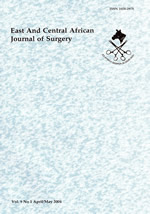
|
East and Central African Journal of Surgery
Association of Surgeons of East Africa and College of Surgeons of East Central and Southern Africa
ISSN: 1024-297X
EISSN: 1024-297X
Vol. 9, No. 1, 2004, pp. 12-17
|
 Bioline Code: js04003
Bioline Code: js04003
Full paper language: English
Document type: Research Article
Document available free of charge
|
|
|
East and Central African Journal of Surgery, Vol. 9, No. 1, 2004, pp. 12-17
| en |
Structured Hernia Training - A pilot Project.
Gwendolyn Hollaar, Merioce Namuyuga, Jane Fuala1, Ronard Lett
Abstract
Background. The current surgical training of interns in Uganda consists of apprenticeship in surgery for 6 months, which in most cases offers inadequate training in surgical procedures. At the completion of this attachment, most interns are not capable of performing common surgical procedures including herniorrhaphy and Caesarean section. To address this inadequacy, a structured hernia course was designed and piloted at Mulago Hospital in Uganda.
Methodology. Six interns at the Mulago Hospital in Kampala Uganda volunteered to participate in the course pilot. Pre- and post-pilot written examinations, which included self-assessment of competency and knowledge of groin hernias and their repair, were compared using students' t-test. Both the surgical preceptor and the intern using a five-point ordinal assessment scale evaluated the surgical performance of each intern. The scores on the ire- and-post-tests were evaluated using t-test. The median scores of the self-assessment questionnaires of interns were evaluated using Fishers exact test and the self-assessment and preceptor scores compared using a Wilcox on signed rank test.
Results. There were no significant intra- or post-operative complications on the day of surgery. All inguinal hernia repairs, except for one, were repaired with local anaesthesia alone. All patients went home on the day of surgery. No postoperative complications were noted at four months. After the course all the six interns felt thatthey had adequate knowledge and skill to do those procedures (pValue = 0.18).
Conclusion. This pilot of a structured hernia course was found to be safe and a satisfactory means of training interns in inguinal hernia repair before they are posted to rural district hospitals.
|
| |
© Copyright 2004 - East and Central African Journal of Surgery
|
|
